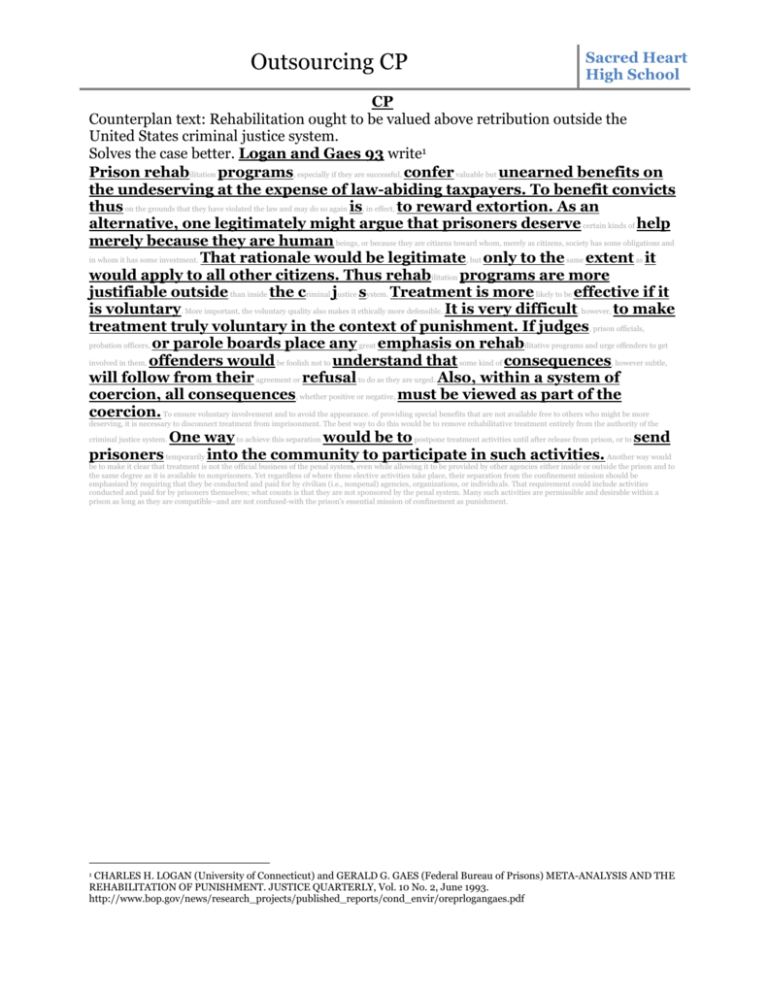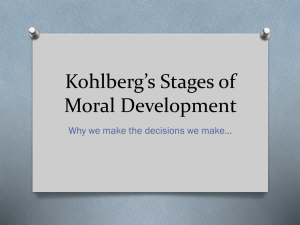Outsourcing CP
advertisement

Outsourcing CP Sacred Heart High School CP Counterplan text: Rehabilitation ought to be valued above retribution outside the United States criminal justice system. Solves the case better. Logan and Gaes 93 write1 Prison rehabilitation programs, especially if they are successful, confer valuable but unearned benefits on the undeserving at the expense of law-abiding taxpayers. To benefit convicts thus on the grounds that they have violated the law and may do so again is, in effect, to reward extortion. As an alternative, one legitimately might argue that prisoners deserve certain kinds of help merely because they are human beings, or because they are citizens toward whom, merely as citizens, society has some obligations and in whom it has some investment. That rationale would be legitimate, but only to the same extent as it would apply to all other citizens. Thus rehabilitation programs are more justifiable outside than inside the criminal justice system. Treatment is more likely to be effective if it is voluntary. More important, the voluntary quality also makes it ethically more defensible. It is very difficult, however, to make treatment truly voluntary in the context of punishment. If judges, prison officials, probation officers, or parole boards place any great emphasis on rehabilitative programs and urge offenders to get involved in them, offenders would be foolish not to understand that some kind of consequences, however subtle, will follow from their agreement or refusal to do as they are urged. Also, within a system of coercion, all consequences, whether positive or negative, must be viewed as part of the coercion. To ensure voluntary involvement and to avoid the appearance. of providing special benefits that are not available free to others who might be more deserving, it is necessary to disconnect treatment from imprisonment. The best way to do this would be to remove rehabilitative treatment entirely from the authority of the One way to achieve this separation would be to postpone treatment activities until after release from prison, or to send prisoners temporarily into the community to participate in such activities. Another way would criminal justice system. be to make it clear that treatment is not the official business of the penal system, even while allowing it to be provided by other agencies either inside or outside the prison and to the same degree as it is available to nonprisoners. Yet regardless of where these elective activities take place, their separation from the confinement mission should be emphasized by requiring that they be conducted and paid for by civilian (i.e., nonpenal) agencies, organizations, or individuals. That requirement could include activities conducted and paid for by prisoners themselves; what counts is that they are not sponsored by the penal system. Many such activities are permissible and desirable within a prison as long as they are compatible–and are not confused-with the prison's essential mission of confinement as punishment. CHARLES H. LOGAN (University of Connecticut) and GERALD G. GAES (Federal Bureau of Prisons) META-ANALYSIS AND THE REHABILITATION OF PUNISHMENT. JUSTICE QUARTERLY, Vol. 10 No. 2, June 1993. http://www.bop.gov/news/research_projects/published_reports/cond_envir/oreprlogangaes.pdf 1 Outsourcing CP Sacred Heart High School Moral Values NB Retribution is key to expressing moral values that deter crime. Logan and Gaes 93 write2 One source of enlightenment can be found in a recent book by David Garland (1990). In Punishment and Modern Society, Garland suggests that we need to concentrate less on punishment has been overestimated as a social tool and underappreciated as a cultural value. As a social tool, punishment has been expected to the social, political, and instrumental purposes of imprisonment and more on its cultural, moral, and expressive values. In modern times, accomplish all kinds of utilitarian objectives where other social institutions already have failed. It is expected to correct the incorrigible, to rehabilitate the wretched, to restrain the dangerous, to deter the determined, and in general to reinforce the social order. Punishment has at best only a limited capacity to achieve these ends, but in any case it Rather, punishment is a significant aspect of culture, with meaning and It is a symbol and an expression of cultural and moral values. Punishment constructs and communicates some of the most important shared meanings, values, and beliefs that define the character of a culture. It "communicates meaning not just about crime and punishment but also about power, authority, legitimacy, normality, morality, personhood, social should not be regarded as a form of social engineering, having worth only because it is useful. merit in itself. relations, and a host of other tangential matters" (Garland 1990: 252). Those who exercise authority and impose sanctions are important cultural agents. They include not only the legislators and judges who define the purpose, nature, and targets of punishment, but also the agents who administer it, from the executive level to the line staff. The prison officials is to help offenders understand the wrongfulness of their criminal conduct and accept meaning and significance of the work they do should be viewed as a moral enterprise, an exercise in the philosophy of punishment. One of the duties of responsibility and accountability for that conduct. This duty requires the imposition of punishment because the very concepts of wrongfulness, responsibility, and accountability must be socially defined and constructed through the use of sanctions. is a positive good Thus punishment is a constructive, not a destructive, enterprise. When done right, it rather than a necessary evil, but to do it right one needs the right people with the right attitudes. Hostility, contempt, and cruelty are inappropriate sentiments toward prisoners, but so too are pity, indulgence, or excessive sympathy and compassion. "Professionalism" is the most appropriate word to describe the proper attitude of impersonal authority, objectivity, and firm but respectful fairness that good officers have toward prisoners. As agents of governmental authority, prison officers must understand that they are obliged to operate within rigid constraints. They ensure that justice is done, first and foremost, by following the rules that define the parameters of justice, the rules that determine what is too permissive and what is too harsh. If inmates are treated unfairly inside prison, they will find it hard to appreciate that it is fair for them to be in prison in the first place. To accept the justice of their punishment, inmates must understand that it is principled, not malicious. Prison officers, as representatives of society, must convey that message to them through their demeanor. First, however, prison officials, and officers must accept without apology the fact that they are among society's "ministers of justice." Think about it: isn't that a more admirable The most negative result of emphasizing rehabilitation is that almost inevitably it demoralizes security and custody staff members who are portrayed (if only by implication) as less professional and less humane than the treatment and program staff. It also impugns the most important purposes of imprisonment–justice, punishment, mission than being a "correctional officer?" Prison officers deserve a more favorable image as agents of punishment. and security–by portraying them as uninspiring, if not morally inferior. Prison professionals need to understand, to be reminded often, and to help the public appreciate that the confining and controlling an unwilling population without violating rights, the job of treating inmates "firmly but fairly," is every bit as praiseworthy as the pursuit of rehabilitation, if not more so. job of CHARLES H. LOGAN (University of Connecticut) and GERALD G. GAES (Federal Bureau of Prisons) META-ANALYSIS AND THE REHABILITATION OF PUNISHMENT. JUSTICE QUARTERLY, Vol. 10 No. 2, June 1993. http://www.bop.gov/news/research_projects/published_reports/cond_envir/oreprlogangaes.pdf 2 Outsourcing CP Sacred Heart High School Human Worth NB Punishment is key to human worth. Logan and Gaes 93 write3 To understand the expressive, or symbolic, importance of punishment is to achieve new insight into the question of treatment versus punishment as purposes of imprisonment and the question of treatment versus custody as functions within a prison. Treatment and confinement are not merely different means; they are also different ends in themselves. When they are debated as ends, the proponents of treatment often tend to assume the moral high ground and the proponents of confinement and punishment often tend to assume a defensive posture. The latter, however, have nothing to apologize for and should not allow others to disparage punitive confinement as "warehousing" or The stereotype of punishment as inherently cruel and inhumane is false and misleading, as is the stereotype of treatment as benevolent and humane. Those who suppose that rehabilitative treatment is intrinsically more humane than punishment have bought into a false dichotomy between punishment and "humanitarianism." It is precisely within the context of punishment, as opposed to treatment, that humanistic concepts are most relevant. Principled and fair punishment for wrongdoing treats individuals as persons and as human beings rather than as objects. Punishment is an affirmation of the autonomy, responsibility, and dignity of the individual; paternalistic rehabilitative treatment is a denial of all three. "caging." CHARLES H. LOGAN (University of Connecticut) and GERALD G. GAES (Federal Bureau of Prisons) META-ANALYSIS AND THE REHABILITATION OF PUNISHMENT. JUSTICE QUARTERLY, Vol. 10 No. 2, June 1993. http://www.bop.gov/news/research_projects/published_reports/cond_envir/oreprlogangaes.pdf 3 Outsourcing CP Sacred Heart High School AT Perm do the CP It’s neg ground. Logan and Gaes 93 write4 But (as one of our reviewers suggested to us) wouldn't minimization of the treatment ideal and a formal acceptance of punishment as the primary goal of prisons tend to minimize programming and remove any possible incentive on the part of administrators to help inmates? As Cullen and Gilbert (1982: 247) argue, "Rehabilitation is the only justification of criminal sanctioning that obligates the state to care for an offender's needs or welfare." We disagree. Rehabilitation raises the question of whether it is society's obligation to transform the inmate into a law-abiding citizen, not whether it is society's duty to treat the inmate humanely. None of the purposes of punishment directly defines a state's obligation to care for inmates. In fact, almost any justification of punishment might be interpreted to imply conditions that range from the brutal to the benign. Rehabilitation in some of its paternalistic forms is just as coercive as other justifications. Inmates may well be "encouraged," or "persuaded" into treatment against their wishes. Retribution, often associated with harsh treatment, also can imply that a prolonged separation from society, proportional to the crime, is sufficient punishment, but that the prison climate must be safe and must offer enough amenities so that prison life is n t inhumane. A state's obligation to its inmates is based on statutory, regulatory, and o supervisory requirements. In practice, however, the quality of confinement is based on the funding levels, management capabilities, and external supervision of a prison or jail. The supervision can come from the legislature, the courts, or even the community. Because corrections is carried out behind walls, gates, and fences, both internal and external supervision are particularly important. We should not confuse supervision, however, with a model of treatment that calls for the transformation of individuals. One also might "treatment versus punishment" is a false dichotomy argue that ; that it is not necessary to abandon the goal of rehabilitation in order to pursue, or even to emphasize, the goal of punishment. That argument is certainly reasonable but we are more prepared to accept it in practice than in principle. In practice, the difference between punishment and treatment is often unclear, particularly to those on the receiving end; a prison that is literally all of one and none of the other is probably impossible as well as undesirable. Even so, an analytic distinction still is necessary. We believe that, when the concepts are understood properly, it can be shown that a philosophy emphasizing punishment is more logically consistent, and even more true to the same general underlying values (such as humanitarianism, respect for the individual, human dignity, justice, fairness, decency, mercy, and compassion), than a philosophy emphasizing rehabilitation. Later we will suggest that many of the activities which now occur under the heading of "programming" might still occur in a punishment-oriented prison. We do not object to treatment that is voluntary, is separated from even in a punishment model, inmates have as much (or as little) right as anyone else to a helping hand from government. The license to punish is not a license to deny to convicts any benefits to which they would be entitled if they were not in prison (with the exception punishment, and is not a privilege unavailable to those who are not in prison. We believe that of denials that are absolutely necessary for reasons of security). We also believe, however, that prison programs can be justified on grounds other (and better) than rehabilitation, and that for both conceptual and practical reasons, as discussed in the next two sections, the idea of inmate programs ought to be separated from the ideal, and the ideology, of rehabilitation. CHARLES H. LOGAN (University of Connecticut) and GERALD G. GAES (Federal Bureau of Prisons) META-ANALYSIS AND THE REHABILITATION OF PUNISHMENT. JUSTICE QUARTERLY, Vol. 10 No. 2, June 1993. http://www.bop.gov/news/research_projects/published_reports/cond_envir/oreprlogangaes.pdf 4 Outsourcing CP Sacred Heart High School AT Perm do Both The perm can’t solve, and doesn’t access the net benefit. It just mixes messages which creates confusion. Logan and Gaes 93 write5 if the official mission of a prison is defined simultaneously as both punishment and rehabilitation conflicting and confusing messages are transmitted both inside and outside the prison walls. Inside the walls, such a definition conveys a message of rights without responsibility. When a prison system is mandated in its mission statement to attempt rehabilitation, or even merely to provide opportunities and resources for self-improvement, that mandate creates for inmates a legitimate claim (a right) to personally beneficial services. At the same time, it undermines inmates' accountability by defining them, like children, as insufficiently developed and disadvantaged As punishment, imprisonment conveys an important cultural message, but persons for whose future behavior society must take some responsibility. Whereas imprisonment as punishment defines inmates as responsible for their past behavior, and whereas discipline within prison defines inmates as accountable for their current behavior, rehabilitation as a goal of the system defines inmates as not fully responsible for their Outside the walls, linking imprisonment with rehabilitation conveys a confusing message to the general public. As punishment, the message of imprisonment is "Felonies are very wrong acts, and those who commit them will be held to account." But the message of the rehabilitation ethic is "Felonies are the result of personal deficiencies (of knowledge, skills, habits, values, temperament, motivation, personality, and so on) future behavior. on the part of the individual; society must attempt to correct those personal deficiencies." That is not an appropriate message for society to construct through its institutions of punishment. Such a message depicts criminal behavior in deterministic terms and portrays offenders as objects in need of adjustment, rather than as responsible human beings who must accept the consequences of their actions. It may not actually excuse their crimes, but it conflicts with and weakens the punishment message. CHARLES H. LOGAN (University of Connecticut) and GERALD G. GAES (Federal Bureau of Prisons) META-ANALYSIS AND THE REHABILITATION OF PUNISHMENT. JUSTICE QUARTERLY, Vol. 10 No. 2, June 1993. http://www.bop.gov/news/research_projects/published_reports/cond_envir/oreprlogangaes.pdf 5







